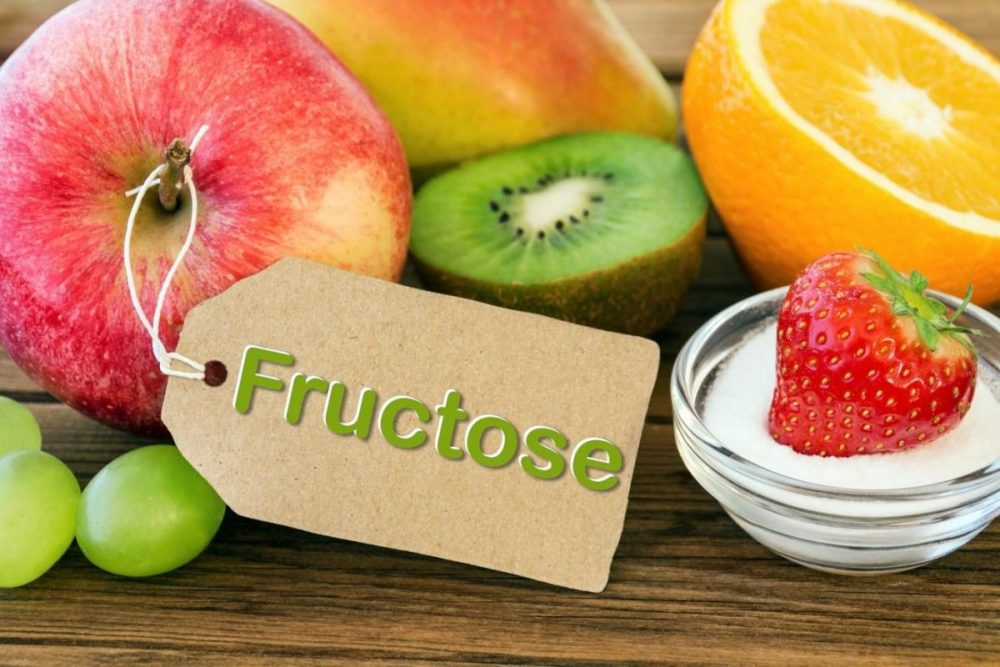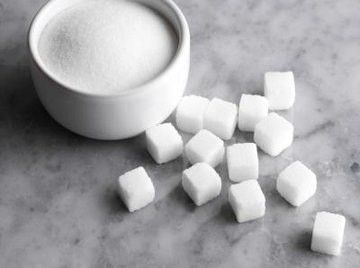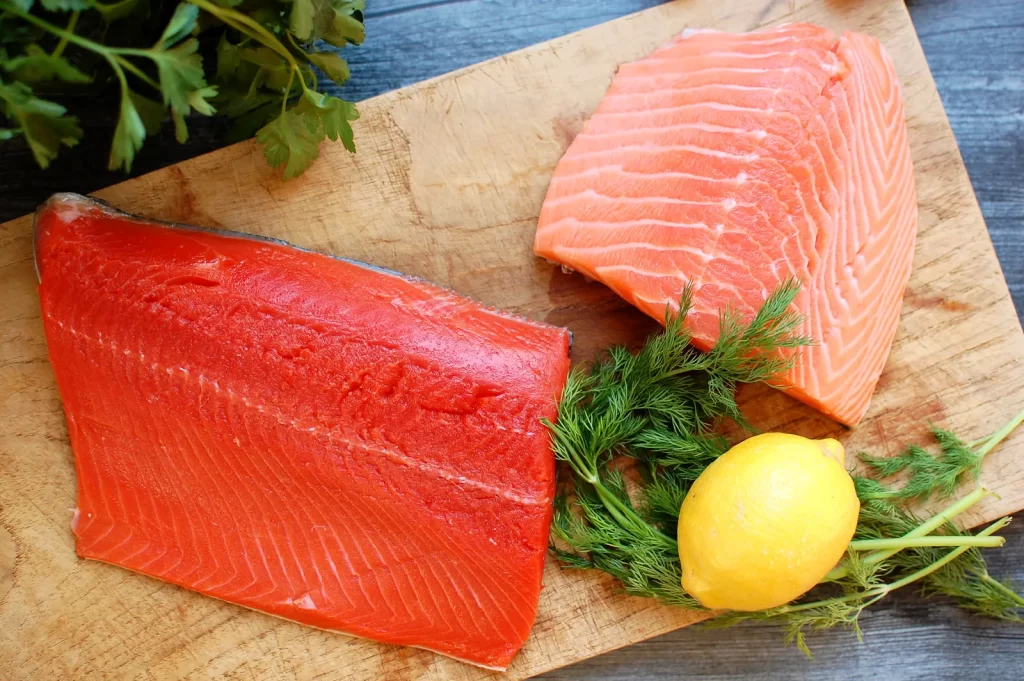Fructose and glucose are both simple sugars or monosaccharides, that play essential roles in our diet and metabolism. Glucose is a primary source of energy for our bodies and is quickly absorbed into the bloodstream, raising blood sugar levels. In contrast, fructose is sweeter than glucose and is primarily metabolized in the liver, making it a key component of table sugar (sucrose) and high-fructose corn syrup.
While both sugars have their unique characteristics and functions, excessive consumption of fructose, particularly in processed foods and sugary beverages, has been linked to various health concerns, including obesity and liver-related issues, making it important to monitor our sugar intake for overall well-being.
What is Fructose?
Fructose is a simple sugar or monosaccharide, that is naturally found in various fruits, vegetables, and honey. It is one of the three most common dietary sugars, along with glucose and galactose. Fructose is known for its sweet taste, even sweeter than glucose, which makes it a common component of many natural sweeteners.

In our diet, fructose is often consumed as part of a disaccharide called sucrose, which consists of one molecule of glucose and one molecule of fructose bonded together. Sucrose is commonly known as table sugar and is found in sugar cane, sugar beets, and many processed foods and beverages.
When we eat foods containing fructose, our bodies metabolize it primarily in the liver, where it can be converted into glucose for energy or stored as glycogen. Excessive consumption of fructose, particularly in the form of high-fructose corn syrup found in many processed foods and sugary beverages, has been associated with health concerns like obesity, insulin resistance, and non-alcoholic fatty liver disease. Therefore, it’s important to consume fructose in moderation as part of a balanced diet.
What is Glucose?
Glucose is a simple sugar, also known as a monosaccharide, that serves as a primary source of energy for living organisms, including humans. It is one of the most essential carbohydrates in our diet and is a fundamental component of various biological processes.

In our bodies, glucose is produced during the digestion of carbohydrates, such as starches and sugars, in foods. It is absorbed into the bloodstream, where it circulates and provides energy to our cells. Glucose is particularly crucial for the proper functioning of our brain and muscles.
When our blood sugar levels rise after eating, the pancreas releases insulin, a hormone that helps cells take in glucose from the bloodstream for energy or storage as glycogen in the liver and muscles. This regulation of blood glucose levels is essential for maintaining overall health.
Glucose is also commonly used in medical settings to diagnose and monitor conditions like diabetes. People with diabetes may have difficulty regulating their blood sugar levels, leading to either high (hyperglycemia) or low (hypoglycemia) glucose levels, which can have significant health consequences if not properly managed.
Comparison table of Fructose vs Glucose
Here’s a comparison table of fructose vs. glucose:
| Characteristic | Fructose | Glucose |
|---|---|---|
| Chemical Structure | Monosaccharide | Monosaccharide |
| Natural Sources | Fruits, honey, some vegetables | Found in various carbohydrates like starch and sugars, including bread, pasta, and rice |
| Sweetness | Sweeter than glucose | Less sweet than fructose |
| Absorption | Metabolized primarily in the liver | Rapidly absorbed into the bloodstream |
| Metabolic Pathway | Converted to glucose or stored as glycogen in the liver | Directly used for energy by cells |
| Blood Sugar Impact | Has a lower glycemic index, meaning it has a slower effect on blood sugar levels | Quickly raises blood sugar levels |
| Role in Energy | Provides sustained energy due to slower absorption | Provides rapid energy |
| Role in Health | Excessive consumption linked to obesity, insulin resistance, and liver issues | Critical for energy metabolism; dysregulation associated with diabetes |
| Common Dietary Form | Component of sucrose (table sugar) and high-fructose corn syrup | Found naturally in carbohydrates and as an ingredient in various foods |
| Dietary Consideration | Moderation recommended due to potential health concerns with excessive intake | Essential for energy and should be consumed as part of a balanced diet |
| Medical Use | Used in some medical tests to assess liver function | Used in medical settings to diagnose and manage diabetes |
Fructose and glucose have their roles and functions in the body, and a balanced diet is essential for overall health. Consuming excessive amounts of sugar can have negative health effects, so moderation is key.
Importance of understanding their differences
Understanding the differences between fructose and glucose is important for several reasons:
- Dietary Choices: Knowing the differences in sugar types helps individuals make informed dietary choices. People can better manage their sugar intake and opt for healthier sources of carbohydrates, reducing the risk of overconsumption of sugars associated with various health issues.
- Blood Sugar Management: Understanding how fructose and glucose affect blood sugar levels is crucial, especially for individuals with diabetes. It allows them to make informed choices about their carbohydrate intake, helping them manage their condition more effectively.
- Health Implications: Excessive consumption of fructose has been linked to various health concerns, such as obesity, insulin resistance, and non-alcoholic fatty liver disease. Knowing these risks can encourage people to limit their intake of high-fructose foods and beverages.
- Metabolism: Understanding the different metabolic pathways of fructose and glucose in the body provides insights into how each sugar affects overall energy metabolism. This knowledge can be valuable for athletes, nutritionists, and those seeking to optimize their energy levels.
- Medical Diagnosis: In a medical context, distinguishing between fructose and glucose is essential for diagnostic tests and assessing certain health conditions. For instance, the liver’s handling of fructose is relevant in tests related to liver function.
- Sugar Substitutes: Understanding the sweetness and properties of fructose and glucose helps in the development of sugar substitutes and low-calorie sweeteners, which can be important for individuals looking to reduce their sugar intake.
- Public Health: On a broader scale, understanding the differences between these sugars is crucial for public health initiatives and policies aimed at reducing sugar-related health problems. This knowledge can inform regulations, nutritional guidelines, and educational campaigns.
Comprehending the distinctions between fructose and glucose is fundamental for making informed dietary choices, promoting better health, managing medical conditions, and shaping public health strategies aimed at reducing sugar-related health risks.
Similarities between Fructose vs Glucose
Fructose and glucose, despite their differences, share some similarities:
- Monosaccharides: Both fructose and glucose are monosaccharides, which means they are the simplest form of carbohydrates and cannot be broken down further into smaller sugars.
- Energy Sources: Both sugars serve as sources of energy for the body. Glucose, in particular, is a primary and immediate energy source for cells, while fructose can be converted into glucose or other energy-related compounds.
- Natural Occurrence: Both fructose and glucose occur naturally in various foods. They are found in fruits, vegetables, and honey, among other sources.
- Chemical Structure: Both sugars have the same chemical formula (C6H12O6) but differ in their structural arrangement, which affects their metabolic pathways and sweetness.
- Sweetness: Both fructose and glucose are sweet, although fructose is generally sweeter than glucose.
- Blood Sugar Elevation: When consumed as part of a balanced diet, both fructose and glucose contribute to the body’s blood sugar levels, although they have different impacts on blood sugar due to variations in their metabolism.
- Metabolism: Both sugars play roles in carbohydrate metabolism. Glucose is directly used by cells for energy, while fructose is primarily metabolized in the liver, where it can be converted into glucose or stored as glycogen.
- Sugar Content in Foods: Both sugars are present in various foods and are commonly used in the food industry as sweeteners. For example, they are components of sucrose (table sugar), which consists of one molecule of glucose and one molecule of fructose bonded together.
Healthy Benefits Fructose vs Glucose
Both fructose and glucose, when consumed in moderation as part of a balanced diet, can provide certain health benefits:
Benefits of Fructose:
- Natural Fruit and Vegetable Source: Fructose is naturally occurring in fruits and some vegetables. When consumed in whole foods, it comes with essential vitamins, minerals, fiber, and antioxidants, contributing to overall health.
- Low Glycemic Index: Fructose has a lower glycemic index compared to glucose. This means it has a slower and more gradual effect on blood sugar levels, making it a suitable option for individuals who need to manage their blood sugar.
- Fiber Content: Fruits and vegetables that contain fructose are often rich in dietary fiber, which promotes digestive health, helps regulate blood sugar, and supports a feeling of fullness and weight management.
Benefits of Glucose:
- Immediate Energy: Glucose is a rapid source of energy for the body. It is quickly absorbed into the bloodstream, making it readily available for cells to use, especially during periods of physical activity or when blood sugar levels drop.
- Brain Function: The brain relies heavily on glucose as an energy source. Maintaining adequate glucose levels in the blood is essential for cognitive function, concentration, and mental alertness.
- Support for Physical Performance: Glucose is vital for athletes and individuals engaging in physical activities. It helps sustain endurance and muscle performance during exercise.
Side effects of Fructose vs Glucose
Here are some potential side effects and health risks associated with the overconsumption of these sugars:
Side Effects of Excessive Fructose Consumption:
- Weight Gain: Excessive fructose intake has been linked to weight gain and obesity due to its potential to promote overeating and fat accumulation, especially when consumed in sugary beverages and processed foods.
- Insulin Resistance: High fructose intake may contribute to insulin resistance, which can lead to type 2 diabetes by making it difficult for cells to respond to insulin signals for glucose uptake.
- Non-Alcoholic Fatty Liver Disease (NAFLD): The liver metabolizes fructose, and excessive consumption can lead to the accumulation of fat in the liver, potentially resulting in NAFLD, a liver condition that resembles the effects of alcohol-induced liver damage.
- Increased Triglycerides: High fructose intake can raise blood triglyceride levels, which is a risk factor for heart disease.
- Elevated Blood Pressure: Some studies have suggested that excessive fructose consumption may lead to elevated blood pressure, which is a risk factor for cardiovascular disease.
Side Effects of Excessive Glucose Consumption:
- Blood Sugar Spikes: Consuming large amounts of glucose-rich foods can cause rapid spikes in blood sugar levels, followed by crashes, which can lead to feelings of fatigue and irritability.
- Insulin Resistance: While glucose is a primary energy source for cells, excessive glucose intake, especially in the context of a high-calorie, high-sugar diet, can contribute to insulin resistance, potentially leading to type 2 diabetes.
- Weight Gain: Overconsumption of glucose-rich foods can contribute to weight gain and obesity, especially when these foods are high in calories and low in nutrients.
- Cardiovascular Risk: A diet high in added sugars, including glucose, has been associated with an increased risk of cardiovascular diseases, such as heart disease and stroke.
Conclusion
Fructose and Glucose are both important sugars with distinct characteristics and roles in the body. Glucose serves as the brain’s primary energy source and is quickly absorbed into the bloodstream, impacting blood sugar levels.
In contrast, fructose, while naturally occurring in fruits and vegetables, can pose health risks when consumed in excess, particularly in processed foods and sugary beverages, as it is primarily metabolized in the liver and has been linked to obesity and metabolic issues. To maintain good health, it’s crucial to consume both sugars in moderation, prioritize whole food sources, and be mindful of added sugars in processed products.


